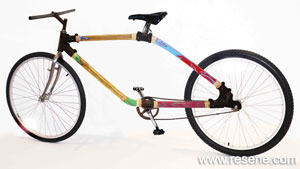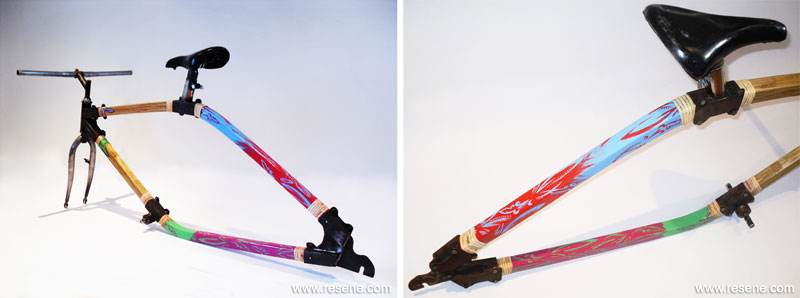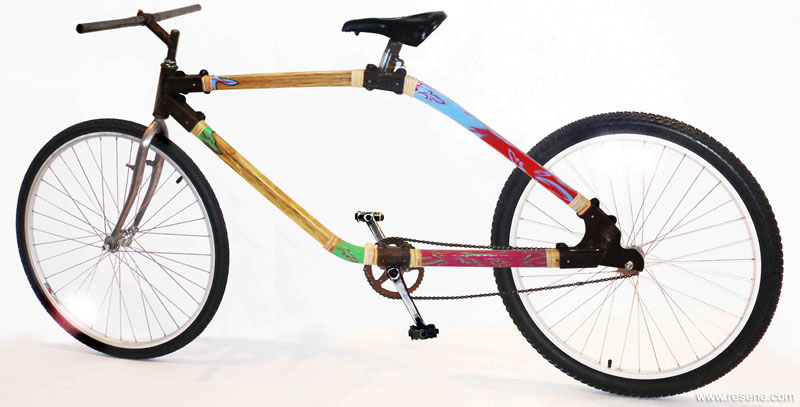Indonesia – New Zealand
Greencycle is a two-year research project to rethink and create a human-powered transportation design that is not only acceptable culturally but also affordable and desirable to users in third world countries.

A culture-centric approach is used to shift design thinking and practices away from the ongoing unsustainable production of goods and services that are unfit for the human conditions in poor countries. Understanding the culture relevance in the analysis, design and evaluation process is the way to ensure that Greencycle is materially, economically and environmentally sustainable.
Most target users cannot even afford to buy a bicycle and their needs have been neglected for sometime. It has become apparent that most bicycle manufacturers are only catering for the middle and luxury ends of the market instead of producing ranges suitable to and affordable for the people who need this form of transportation the most – the lower income bracket, whose livelihood depends on it to make ends meet.

The focus of this research project is to look at ways of reducing manufacturing processes and costs while utilizing local resources and harnessing local craftsmen’s skills to produce a design outcome that will be best utilised by the target users to meet their needs, wants and ways of life.
The design process applies system design thinking, informed by cultural insights, to improve on this form of human powered transportation, taking into account the behaviour, belief and value relevance, functionality, the needs and wants of the users, and the use of appropriate technologies and environmental considerations. The production and manufacturing of Greencycle was done in Indonesia; this has provided important insights into the local craftsmen’s capabilities and limitations which will be used in the ideation process for the next generation of the Greencycle design idea.
A laminating process was used to create the form for the bicycle frame as this is a relatively easy, economical and low technology process. Two identical curved laminated bamboo pieces were placed in opposite directions and joined using simple steel brackets to produce a simple yet very strong construction. This construction also allows for a seat bracket and paddle bracket which can be adjusted along the two curved frames to suit different users. Rattan lashing was also used as a secondary binding to reinforce the laminated bamboo layers.

Taking into consideration the limitation of local skills, recycled parts were used in the construction of Greencycle. This included more complex bicycle parts such as the head and pedal tubes which otherwise would need to be manufactured using high technology. These bicycle parts can be easily found in local secondhand or flea markets because in most Third World countries the people’s lifestyle revolves around recycling materials.
An observation in Indonesia showed that public transportation owners have a tendency to decorate their vehicles in bright colours and motifs to personalise them. This ranges from simple coloured geometric forms or images of local scenes to painted portraits of their loved ones.
For this project Environmental Choice approved Resene Lumbersider paint was chosen for its low VOC (Volatile Organic Compound) content. Bright glossy warm colours are contrasted with cool colours to provide maximum visibility for safety when in busy traffic with other motorised vehicles. Resene Subzero meets Resene Guardsman on one part while Resene Fruit Salad meets Resene Lipstick on another. Resene Aquaclear waterborne urethane is used on other bamboo parts to protect the timber and showcase the local artisan skill and craftsmanship, which also provides a sense of pride and empowerment.
The motive chosen for this product is a reflection of traditional Indonesian ‘Batik’ depicting bamboo leaves. This would support the romantic notion that artefacts can be made by the end users or locals from the lowest income demographic of third world countries to meet their own needs and wants while being economically and environmentally sustaining.
This focus of cultural-centric design is not only to improve the usability of a product but also it becomes more personally related and meaningful to the user’s way of life and also improves the livelihood of local artisans therefore supporting and preserving their traditional skills.
Exploring local skills and the crafts industry and choosing readily available materials and parts not only helps to create jobs for local industry but also keeps the cost as economical as possible to ensure product sustainability. As a result of this process it was realised that a small business plan could be developed to support and encourage local cottage industries. With the right guidance from the designer, it is now looking viable to have truly sustainable businesses not only in Indonesia but also for low income bracket users in other countries such as India and parts of Africa and China.
Designer: Paulus Maringka, Design Zone
Project: Resene Total Colour Awards 2012
Resene case studies/awards project gallery
View case studies that have used Resene products including many from our Resene Total Colour Awards. We hope these projects provide inspiration for decorating projects of your own... view projects
Total Colour Award winners:
2023 |
2022 |
2021 |
2020 |
2019 |
2018 |
2017 |
2016 |
2015 |
2014 |
2013 |
2012 |
2011 |
2010 |
Entry info
Latest projects | Project archive | Resene news archive | Colour chart archive